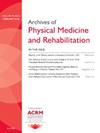The Effect of Preinjury Psychiatric Difficulties on Caregiving Needs and Postinjury Emotional Distress in Care Partners of Persons With Traumatic Brain Injury
IF 3.7
2区 医学
Q1 REHABILITATION
Archives of physical medicine and rehabilitation
Pub Date : 2025-09-01
DOI:10.1016/j.apmr.2025.03.035
引用次数: 0
Abstract
Objective
To examine differences in postinjury needs in traumatic brain injury (TBI) care partners with and without a preinjury psychiatric history (positive preinjury psychiatric history [PH+] vs negative preinjury psychiatric history [PH−]).
Design
A multisite, prospective, observational cohort study.
Setting
Community.
Participants
Two hundred fifty-eight care partners (N=258) for persons with TBI meeting the following criteria: ≥18 years old; nonpaid caregiver; TBI care recipient criteria: ≥16 years old at time of injury, TBI requiring inpatient rehabilitation; acute hospitalization/admission at Traumatic Brain Injury Model System–approved inpatient rehabilitation site.
Interventions
Not applicable.
Main Outcome Measures
Family Needs Questionnaire-Revised assessed percentage of emotional, instrumental, professional, and community support needs met at 6 months after injury. Secondary Outcome Measures: Patient Health Questionnaire-9 and Generalized Anxiety Disorder-7 assessed care partner depression and anxiety at 6, 12, and 24 months after injury.
Results
At 6 months after injury, care partners reported more met needs for community support relative to instrumental support needs (estimates, 7.30; 95% confidence interval [CI], 3.91-10.69; P<.001). PH+ care partners did not differ from PH− care partners in the percentage of met needs across any need category. Number of psychiatric diagnoses (0 vs 1 vs 2 vs 3+) was not associated with differences in met needs. PH+ care partners endorsed more depression and anxiety symptoms than PH− care partners from 6 to 24 months after injury (depression: estimates, 3.78; 95% CI, 2.55-5.00; P<.001; anxiety: estimates, 2.91; 95% CI, 1.58-4.24; P<.001).
Conclusions
While PH+ TBI care partners do not appear to have differing needs compared to PH− care partners at 6 months after injury, they do experience persistent emotional distress. Evaluating care partners’ psychiatric history is warranted to identify caregivers vulnerable to developing post-TBI emotional distress.
创伤性脑损伤患者创伤前精神障碍对护理需求和创伤后情绪困扰的影响
目的:探讨创伤性脑损伤(TBI)护理伙伴在损伤后需求方面的差异,有无损伤前精神病史(PH+与PH-)。设计:一项多地点、前瞻性、观察性队列研究。设置:社区。参与者:258名满足以下标准的TBI患者的护理伙伴:≥18岁;非照顾者;创伤性脑损伤护理对象标准:损伤时年龄≥16岁,创伤性脑损伤需要住院康复;在tims批准的住院康复中心急性住院/入院。干预措施:不适用,主要结果测量:经修订的家庭需求问卷(FNQ-R)评估了受伤后6个月满足的情感(ES)、工具(IS)、专业(PS)和社区(CS)支持需求的比例。次要结果测量:患者健康问卷-9 (PHQ-9)和广泛性焦虑障碍-7 (GAD-7)在损伤后6、12和24个月评估护理伙伴的抑郁和焦虑。结果:在受伤后6个月,护理伙伴报告的社区支持需求比工具支持需求更多(估计;95% ci: 7.30;结论:在损伤后6个月,PH+ TBI护理伴侣与PH- TBI护理伴侣的需求没有差异,但确实经历了持续的情绪困扰。评估护理伙伴的精神病史是必要的,以确定护理人员易患创伤性脑损伤后的情绪困扰。
本文章由计算机程序翻译,如有差异,请以英文原文为准。
求助全文
约1分钟内获得全文
求助全文
来源期刊
CiteScore
6.20
自引率
4.70%
发文量
495
审稿时长
38 days
期刊介绍:
The Archives of Physical Medicine and Rehabilitation publishes original, peer-reviewed research and clinical reports on important trends and developments in physical medicine and rehabilitation and related fields. This international journal brings researchers and clinicians authoritative information on the therapeutic utilization of physical, behavioral and pharmaceutical agents in providing comprehensive care for individuals with chronic illness and disabilities.
Archives began publication in 1920, publishes monthly, and is the official journal of the American Congress of Rehabilitation Medicine. Its papers are cited more often than any other rehabilitation journal.

 求助内容:
求助内容: 应助结果提醒方式:
应助结果提醒方式:


